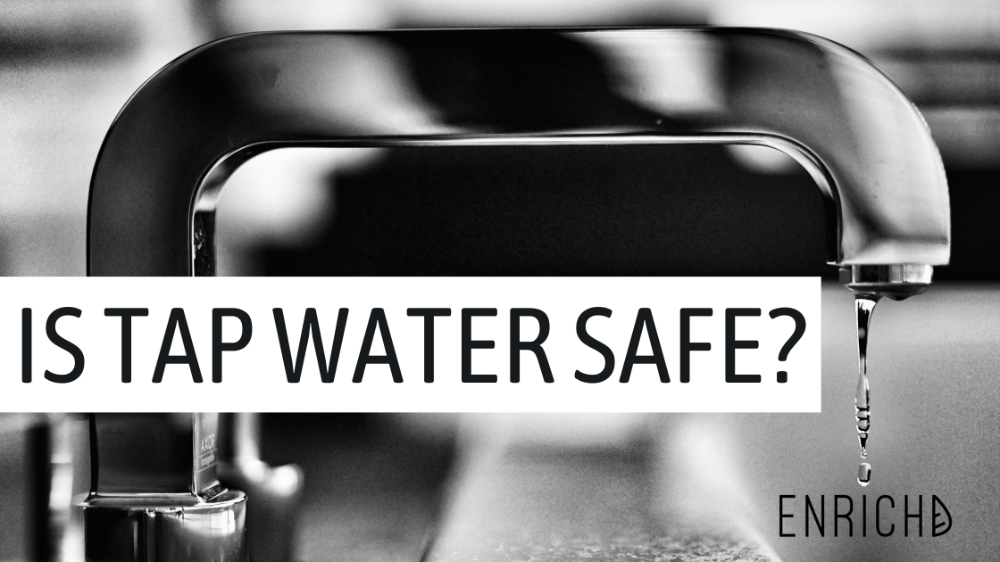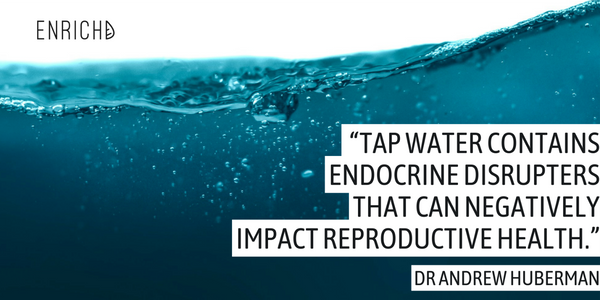
Is tap water safe for you, your tea and coffee?
(No boiling it doesn't remove the DBPs - more on those below) I almost added a LOL here though restrained myself ;)
This ENRICHD blog post is to give you the important notes of his 2.5 hour delivery on How to Optimise Your Water Intake for Health by Dr Andrew Huberman.
Most of your tea, coffee, cacao, mushroom drink et al. is water. So you're going to want to make sure for safety and flavour it's clean, right?
For context and appreciation, this post is inspired by Dr Andrew Huberman's reporting on Water. I find that he's generally a very pragmatic, solution oriented person and his reporting comes from a place of hypothesis, study, results, action. More on Huberman at the bottom of this post.
"In researching tap water and what's contained in tap water, in different regions, not just in the US but around the world, I confess - the picture is a pretty scary one."
"Much, if not all tap water contains things that are bad for the biology of our cells"
Huberman notes that there is a silver lining, simple steps including using water filters that remove the unwanted compounds.
Going forward: DBP = Disinfection Byproducts. Which are found in tap water, and can be thought of literally as byproducts of tap water being disinfected.
The "Need to Know"
- Tap water contains endocrine disrupters / Hormone Disrupters that can negatively impact reproductive health in males and females.
- There are studies that show the concentration of Fluoride in tap water is of particular concern for the thyroid hormone system of the body.
Thyroid hormone is very important for metabolism, energy, brain function, mood/depression, sleep, reproduction, bone health, tissue health, essentially everything!
- Tap water contains DBP = Disinfection Byproducts. Which are reportedly added to provide "clean" water.
- It's very clear that DBP's can cause endocrine disruption in ways that are not good for reproductive health.
- DBP's have been shown to disrupt ovarian function, spermatogenesis and fertility outcomes. (Even at concentrations of DBPs in tap water).
- Use a filter and ideally one that removes Lead, Fluoride, DBPs, Chlorine. Many do not.

What else?
- Fluoride concentration of just 0.5mg per litre can disrupt thyroid function.
- Remember how important drinking water is to life.
- Get a water analysis from your local government/government site.
Note these may be averages/check the dates.
- Get the best filter you can to suit your budget.
What do I do?
Rich: I personally use a 5L table top filter which is then filtered through another small hand held filer. I also distill some water for cooking and drink glass bottled water by Highland Spring or Waitrose Deeside water when in the UK. Tesco Ashbeck 5L bottles for tea events when filtration is not possible because I've seen this water tested in front of my eyes, by some miracle tends to be cleaner than most.
Final thoughts...
Enjoy your ENRICHD Mushroom drinks, Tea, Coffees or whatever else you're drinking in the knowledge you've done everything you can to optimise it for your health.
Andrew Huberman Ph.D
Andrew Huberman, Ph.D., is a neuroscientist and tenured professor in the department of neurobiology, and by courtesy, psychiatry and behavioral sciences at Stanford School of Medicine. He has made numerous significant contributions to the fields of brain development, brain function and neural plasticity, which is the ability of our nervous system to rewire and learn new behaviors, skills and cognitive functioning.
Articles
1) Impact of cold exposure on life satisfaction and physical composition of soldiers (BMJ Military Health)
2) Circadian rhythms and the kidney (Nature Review Nephrology)
3) Endocrine Disruptors in Water and Their Effects on the Reproductive System (International Journal of Molecular Sciences)
4) Impact of Drinking Water Fluoride on Human Thyroid Hormones: A Case- Control Study (Scientific Reports)
5) Regulations for calcium, magnesium or hardness in drinking water in the European Union member states (Regulatory Toxicology and Pharmacology)
6) Electrolyzed-Reduced Water: Review I. Molecular Hydrogen Is the Exclusive Agent Responsible for the Therapeutic Effects (International Journal of Molecular Sciences)
7) Electrolyzed-Reduced Water: Review II: Safety Concerns and Effectiveness as a Source of Hydrogen Water (International Journal of Molecular Sciences)
8) Hydrogen-rich water reduces inflammatory responses and prevents apoptosis of peripheral blood cells in healthy adults: a randomized, double-blind, controlled trial (Scientific Reports)
